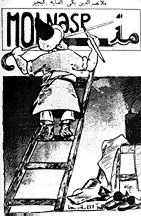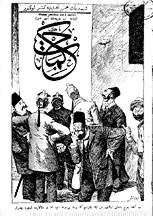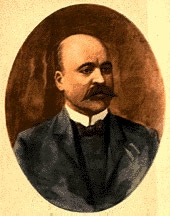|
|
 |
 |
The editor of "Molla Nasraddin,"
Jalil Mammadguluzade (1866-1932), and his staff of cartoonists,
writers, and poets did battle with every major social and political
issue of their time. Unfortunately, many of the problems they
identified 80-90 years ago still exist.
In one of the earliest issues (1906), Molla Nasraddin is quoted
as saying, "When you pick up any (Muslim) newspaper, you
can see only the following: Fine fellow is such and such khan,
such and such Haji, such and such creature. But they never write
about the groans of thousands of starving Moslems and thousands
of rubles being spent on the feasts, funeral banquets, and presents
for their mistresses. I'm sick and tired of these words."
(Molla Nasraddin, 1906, volume 4).
The magazine played on certain themes over and over. These included:
(1) the precarious geographic location of Azerbaijan as a buffer
between Russia and Iran; (2) the colonialist attitudes of Persian
shahs and Russian tzars towards Azerbaijan; (3) the disdainful
attitude of the intelligentsia towards anything "Azerbaijani"
whether related to culture, the education system, or language;
(4) the abusive treatment of women in a male-dominated society;
(5) the lack of safety, health and financial well-being for the
average worker and citizen; (6) the hypocrisy of fanatic clergy;
(7) the corruption and abusiveness of people in high positions;
(8) the ignorance and naiveté which made people vulnerable
to being cheated and abused by all of these social ills because
they refused to become educated; and finally (9) advocacy for
an alphabet that would foster literacy. [Finally, in 1929, the
Arabic script was replaced by a modified Latin alphabet].
Like a fearless dragon slayer, the magazine went on a rampage
to rout these evils from society using humor to make their point
through cartoons, letters to the editor, want ads, anecdotes,
stories and news items. A few samples follow:
Irresponsibility of
the Press Snobbery of the Intelligentsia
The magazine especially
attacked the snobbery and egoism of "the so-called intelligentsia"
who were so much involved with the Russian language and culture
that they considered it shameful to speak Turkic.
Molla Nasraddin writes, "Now, I have completed my speech
and I have only one apology. Please excuse me, my Turk brothers,
that I addressed you in Azerbaijani (or "Turk" as it
was called in those days). I know it's shameful and indicates
a person's lack of knowledge. But sometimes, it wouldn't be so
bad, would it, to recollect the old days, when your mother, swinging
your cradle, used to sing lullabies in your mother language?"
Another example of the lack of attention to the Azerbaijani language
was found in a "want-ad" announcement: "Where
is it possible to find a textbook to educate a child in Turk?"
Wasted Leisure
Molla Nasreddin observed
that the main reason why people were so ignorant and naive was
that they didn't get involved with endeavors like reading and
studying because they considered them to be a waste of time.
One of the articles satirizes a scene Molla passed every day
as he walked through the city: "Every evening when I take
a stroll and see my fellow countrymen, my heart swells up with
pride. I see how much they enjoy themselves in the 'Governor's
Park' [where Philharmonic stands today], each having his arm
around one of the coiffured Russian ladies. I really feel proud
because, thank God, they are so advanced. No nation in the world
enjoys themselves more than we Azerbaijanis do. Sometimes you
see these stupid Russians, Armenians, Polish and others sitting
on a bench, squinting their eyes to read a 'Baku' or 'Caspian'
newspaper, or talking about politics. What a headache!"
Education
"Molla Nasraddin"
severely attacked people who prevented their children, especially
girls, from attending school. "Why should a girl attend
school?" Molla asks. "The only thing a girl should
learn is how to cook and how to put her mother-in-law and father-in-law
in their places when necessary."
Education at madrases (religious schools) was strongly criticized
as children had to learn phrases by heart in the Arabic language,
without having a clue as to their meaning.
Women's Rights
The rights of women
were among the staff's greatest concerns. They were continuously
writing about the conditions that kept women ignorant, especially
since women fostered the main care and nurture of children. Rarely
did women get the chance to go out and gain exposure to new ideas.
Most were illiterate; few had opportunities to receive formal
education. They lived in a dark world shrouded from head to toe
in black chadors. While men were involved with gambling and having
affairs with attractive, Western-dressed Russian women, Azerbaijani
wives stayed at home, slaving at housework and caring for children.
The magazine published a "Guide for the Families When There
is a Pregnant Woman" which satirizes the lack of esteem
held for women. One article reads, "In case the pregnant
woman has forgotten to put salt in the dizzy [a soup made of
lamb meat, potatoes and garbanzo beans], the husband should not
kick her out of the house or throw his shoe after her. The wife
could stumble and fall down and then lose the baby. To hell with
the wife, but why lose the baby? It may be a boy!"
From Azerbaijan
International
(4.3) Autumn 1996.
© Azerbaijan International 1996. All rights reserved.
Back to Index
AI 4.3 (Autumn 1996)
AI Home
| Magazine
Choice
| Topics
| Store
| Contact
us

